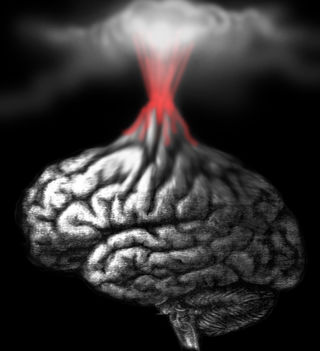Sex
How Sex Can Literally Blow Your Mind
Research on transient global amnesia and more serious concerns.
Posted November 14, 2019 Reviewed by Hara Estroff Marano
We’ve all heard the phrase, but can it really happen? Can sex actually blow your mind? Indeed, it can. Sex can change your brain and make you lose your memory temporarily by triggering an episode of ‘transient global amnesia’, or it can even cause permanent brain damage by rupturing a brain aneurysm. In the rare cases where these conditions are sex-induced, it seems it is the dramatic blood flow changes in the brain that occur during sex that are to blame.
Transient global amnesia is a sudden and temporary impairment of memory during which a person cannot learn or recall new information (anterograde amnesia) and may also have difficulty recalling old memories (retrograde amnesia).
During transient global amnesia, the person remains alert and aware of their personal identity and is able to communicate. The main symptoms are repetitive questioning and disorientation. It typically occurs as a single episode and is considered a ‘benign’ disorder, as the memory problems completely resolve within 24 hours and there are no long-term effects.
Although there have been hundreds of reported cases of transient global amnesia in the medical literature, its cause is still unknown, and it is regarded as one of the most mysterious of all the neurological conditions. Various triggers have been reported, including strenuous physical activity, emotionally arousing or stressful events, a sudden change in body temperature, and – yes – sex.
In a study that specifically explored what triggered transient global amnesia, sex was the most common precipitant, reported in a third of the 21 cases. Sex ticks two of the boxes of the known triggers for this type of amnesia: it can be both physically strenuous and emotionally arousing. This is particularly so if the sex is with someone who is not your usual partner.
Interestingly, this same study distinguished between sex that was ‘conjugal’ (within a married or established couple) or ‘extra conjugal’ (outside of a marriage or relationship—in other words, during an affair), and noted that being unfaithful could be considered a "stressful situation"; it had been reported in several transient global amnesia cases.
There are also other neurological events that can be triggered by sex. Sex can actually cause a stroke. If you are unlucky enough to have a brain aneurysm, a malformation that looks like a small balloon protruding out the side of a blood vessel in your brain, intense physical activity such as sex (especially with an orgasm) can cause the aneurysm to rupture or burst.
A ruptured brain aneurysm can result in blood leaking into your brain, which is called an intracranial hemorrhage and is a type of stroke, or it can cause a subarachnoid hemorrhage, which means that the blood has leaked under the arachnoid mater, one of three membranes that cover the brain.

A brain aneurysm can grow anywhere within the blood vessels of your brain, and the effects of a ruptured aneurysm depend on where it is located. It is estimated that 1 in 50 people have an unruptured brain aneurysm, and most people would not even know they have one—they are most often discovered incidentally during a brain scan in search of other conditions.
Treatment of an unruptured brain aneurysm to prevent it from rupturing and bleeding involves "clipping" (where the blood vessel under the aneurysm is clipped), endovascular treatments (coiling, stents, or flow diversion), or just leaving it alone and monitoring it over time. A ruptured brain aneurysm is a very dangerous event—it causes death in 40 percent of cases; of those who survive, two-thirds end up with a neurological deficit.
So, if you have a brain aneurysm, how likely is it that having sex will cause it to burst? One study estimated that intense physical activity such as sex can make an aneurysm up to 15 times more likely to rupture. Case studies have reported that sex was the immediate preceding activity before a ruptured aneurysm in up to 14 percent of patients, and this is much more common in men (33 percent) compared to women (7 percent).
This gender difference is a surprise, as brain aneurysms are actually more common in women, and women have longer orgasms than men. It has been proposed that the higher risk of sex-induced subarachnoid hemorrhage due to ruptured brain aneurysm in men is due to the greater increase in arterial blood pressure that they experience during sex.
How can sex cause a brain aneurysm to burst? The two key factors that make brain aneurysms rupture are increases in blood pressure and a sudden reduction in intracranial pressure. This is exactly what occurs during sexual activity, particularly in the late plateau and orgasm phases of the human sexual response cycle outlined by Masters and Johnson. The profound changes in blood pressure, heart and respiratory rate, and muscle tension that accompany these sexual response phases result in increasing pressure on the wall of the aneurysm, making it more likely to burst.
When a ruptured brain aneurysm is triggered by sex, it turns out that sudden death is much more likely if you are having sex with someone who is not your usual partner. In other words, the excitement of extra-marital or "unfaithful" sex in an unfamiliar environment is associated with more intense cardiovascular changes (that is, to heart rate and breathing rate) than those that occur during sex with your long-term partner in your bed at home.
Heavy food and alcohol intake are also associated with increased blood pressure and the risk of a ruptured brain aneurysm. So, if you have a brain aneurysm, think twice before booking that fancy restaurant and hotel room for a fling. Sticking with your current partner might just save your life.
To answer the question posed in the title, yes, sex can literally "blow your mind." Incredibly, where you have sex, who you have it with, and whether you reach orgasm all have an impact on exactly what happens in your brain.
This is an adapted excerpt from Sex in the Brain: How your brain controls your sex life (NewSouth Publishing, 2019; and forthcoming Columbia University Press, 2020).
Facebook image: MaryMistan/Shutterstock
References
Brain Aneurysm Foundation. (2019). Statistics and facts. Brain Aneurysm Foundation, <https://bafound.org/about-brain-aneurysms/brain-aneurysm-basics/brain-a…;.
Foreman, P.M., Griessenauer, C.J., Selim, M.H., Searls, D E.C., Safdar, A., Kasper, E.M., ... Thomas, A.J. (2016). Sexual activity as a trigger for intracranial hemorrhage. Acta Neurochirurgica, 158(1), 189–195.
Inzitari, D., Pantoni, L., Lamassa, M., Pallanti, S., Pracucci, G., & Marini, P. (1997). Emotional arousal and phobia in transient global amnesia. Archives of Neurology, 54(7), 866–873.
Maloy, K., & Davis, J.E. (2011). ‘Forgettable’ sex: A case of transient global amnesia presenting to the emergency department. Journal of Emergency Medicine, 41(3), 257–260.
Reynolds, M.R., Willie, J.T., Zipfel, G.J., & Dacey Jr., R.G. (2011). Sexual intercourse and cerebral aneurysmal rupture: Potential mechanisms and precipitants: A review. Journal of Neurosurgery, 114(4), 969–977.




